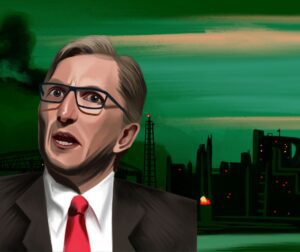
The impacts of climate change are downright frightening. But the villain behind one of Canada’s biggest tar sands companies can also cause a real jump-scare. Introducing Rich Kruger – the nightmare on Oil Street.
Rich Kruger is the CEO of Suncor, a company responsible for nearly 35 million metric tons of climate pollution annually – the equivalent of 8.3 million gas-powered cars driving for a year. He was called to testify at Parliament Hill twice in the last year and was grilled by members of parliament about the company’s emissions and failure to act responsibly on climate change.
Suncor is also a founding member of the Pathways Alliance, a fossil fuel industry association made up of six major tar sands producers and the newest major lobby group. This lobby group has been trying to re-brand tar sands companies as they are working on climate solutions. It spent millions of dollars on its rebranding ad campaign and is lobbying hard for false solutions like carbon capture so that the oil companies can continue justifying increased oil production. We’ve called out their misinformation, and they’re currently under investigation by the Competition Bureau.
That’s not all. After the government passed new rules to crack down on greenwashing, the Pathways Alliance scrubbed its website and social media of all of its climate and carbon capture content. It didn’t have the evidence needed to back up their claims. The Pathways Alliance and Suncor have both opposed these new greenwashing rules in online statements.
That’s why we need your help to make sure the greenwashing rules don’t get weakened. The Competition Bureau is conducting a public consultation right now in order to develop guidelines for how the rules will be enforced. Will you send a letter demanding fair and strong enforcement of anti-greenwashing rules?


- Suncor Energy Inc: 2023-Present
- Imperial Oil Ltd: 2013–2019
- ExxonMobil Corp: 1981-2013
Villain Career Profile
Rich Kruger has a long and storied career in oil. In fact, he’s been developing oil for longer than the lives of millennials and Gen Zers, who will deal with the escalating consequences of the climate crisis fuelled by Kruger’s companies. He began working at Exxon in a technical role in 1981. He then rose through the ranks at Exxon during the time when the company was successfully suppressing and denying climate science and spending big on climate denial and political obstruction. He joined regional leadership in 1999, became executive VP Production in 2006, and President of Exxon Production and VP of Exxon Corp in 2008. During the 1990s, Exxon promoted disinformation about the certainty of climate science despite findings by Exxon and Imperial Oil (a subsidiary of Exxon) confirming climate science in the 1970s-1980s. It wasn’t until 2007 that Exxon publicly acknowledged that climate change was occurring and largely driven by the burning of fossil fuels. Despite this, throughout the 2000s and 2010s, it continued to publicly cast doubt about climate science, fund climate denial groups and think tanks and promote fossil fuel expansion and use.
Rich Kruger then brought his world-class expertise in resource exploitation to the tar sands in Canada, becoming CEO at Imperial Oil in 2013. During his tenure as the head of Imperial, Kruger was critical of government environmental policy, such as the clean fuel standard, and he had little interest in branching out into renewable energy. When he advocated against the Alberta government’s climate action, he said it wasn’t about opposing then-premier Notley’s climate plan but rather his objection to putting any sort of production limit on the industry, a position he maintains to this day.
Kruger had retired from Imperial but couldn’t resist the call of money and that sweet, sweet crude. His dedication to producing climate pollution was so strong that he came out of retirement for the role of CEO at Suncor – and for $37.8 million in compensation in his first year. That same year, Suncor weakened its climate reporting by ending the inclusion of scope three greenhouse gas emissions (the emissions that come from burning the oil and gas that Suncor sells and profits off of). Their climate report does not include a 1.5-degree scenario, the threshold to which countries have agreed to limit global warming. This followed previous advocacy by the company that argued against rules that would force companies to share how climate change risks disrupting their business plans and finances.
Suncor is the oil company with the highest annual emissions in Canada. While Suncor has been a top polluter for many years, there was a time when the company was also involved in renewables. Suncor sold off its wind and solar assets in 2022, and now Kruger is taking up the mantle of resisting the energy transition. In one of his first meetings with shareholders, Kruger explicitly said Suncor had been too focused on the energy transition and, under his leadership, would prioritize short-term profits for shareholders through oil and gas.
Now that Rich Kruger is back in the game, he’s fighting for Suncor’s right to pollute the planet for profit. With his years of tireless service to fossil fuels, Kruger is proud to be one of the top Climate Villains in Canada.
TOP SKILLS

CAREER HIGHLIGHTS
Polluting like a Pro
-
- Suncor topped the list of most polluting companies in Canada numerous times.
- Suncor plans to expand operations at its Fort Hills site by expanding into a sensitive wetland ecosystem.
- Suncor’s US-based refinery in Colorado has been repeatedly charged by the Environmental Protection Agency for failing to meet environmental standards and exceeding pollution levels, as well as accident prevention and reporting violations.
- Pollutants from the refinery, including benzene and hydrogen cyanide, are known carcinogens and the community near the facility experience higher than average cancer and negative health outcomes.
- In April of 2023, Suncor dumped massive quantities of oil sands mine waste-water from its Fort Hills tailings pond into surrounding waterways. Athabasca Chipewyan First Nation Chief Allan Adam said that the six-million-litre release into the Athabasca River reflected “a systemic problem with the management and structural integrity of tailings ponds across the entire region, and a regulator that refuses to regulate.”
- The following is a list of leaks and spills that occurred at Imperial facilities during his tenure as CEO there:
- 2014 — Sarnia, ON: 3.5-hour leak of hydrogen sulphide gas
- 2016 — Sarnia, ON: 21 to 43 barrels of broiler cleaning acid solution
- 2017 — Cold Lake, AB: 1.2 M litres of heavy oil and contaminated produced water leaked
- 2017 — Sarnia, ON: 10-day uncontrolled flaring incident. Imperial was investigated but did not face charges.
- 2019 — Nanticoke, ON: 95 litres of diesel was lost from a leaking valve
 Rebranding the Oil Lobby with Greenwashing
Rebranding the Oil Lobby with Greenwashing
- Suncor was the oil company that lobbied the federal government most in 2023, meeting with government officials 93 times. It is also a member of both of the industry associations that lobbied the government most last year. The Canadian Association of Petroleum Producers lobbied the government in 91 meetings and the Pathways Alliance lobbied in 104 registered meetings, in addition to regular un-registered meetings initiated by federal ministries.
- Suncor is one of the six companies that make up the Pathways Alliance. The Pathways Alliance is currently under investigation by the Canadian Competition Bureau for false and misleading claims made in its ‘Clear the Air’ public advertising campaign, following a request from Greenpeace and the Canadian Association of Physicians for the Environment. (It recently scrubbed its website in response to new anti-greenwashing rules from the federal government)
 Helping the Rich get Richer
Helping the Rich get Richer
- Kruger has made clear that Suncor’s interests are growing profit for their shareholders through doubling down on fossil fuel expansion. During one of the first shareholder meetings in his role as CEO he said “I very much believe in making money. We are in the business to make money and as much of it as possible, and everybody starting with me needs to see how they do that.”
- A recent academic study demonstrated how ownership of Canada’s largest oil sands companies, including Suncor, is highly concentrated among just 14 prominent shareholders who collectively control significant share value. Over 70 per cent of these major shareholders are foreign entities. That means most of the financial value extracted from oil sands don’t stay in Canada, but flow through private investment firms to large shareholders elsewhere.
 Failing Workers
Failing Workers
- Suncor laid off more than 1,500 workers to increase profits.
- Kruger was quoted saying “I think we can eliminate work. I think we can do away with work that doesn’t add value,” adding that all employees need to consider how their role helps to generate revenue for Suncor.
- Suncor racked up 32 safety violations between November 2022 and January 2023, and was recently charged by Alberta Occupational Health and Safety for five safety violations after the death of a worker at Suncor Energy Inc.’s majority-owned unit Syncrude Canada Ltd. site.
The Climate Villains campaign highlights the leaders of the fossil fuel industry that play key roles in expanding and financing climate-wrecking fossil fuels, blocking climate action, and spreading disinformation. These villains are more concerned about their profits and wealth than the future of the planet, and that’s why we’re profiling the ‘resume’ of each climate villain.
The post Rich Kruger: The Nightmare on Oil Street appeared first on Environmental Defence.
This post was originally published on Environmental Defence.